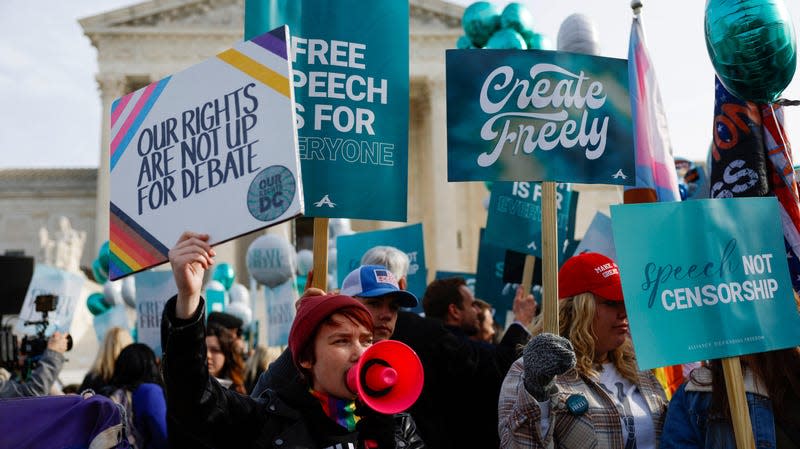The Colorado wedding website case is asking the Supreme Court to get creative about human rights

It’s unlikely gay clients will be flocking to Lorie Smith’s web design business in Colorado. But, just in case, Smith is preemptively suing the state for the right to legally refuse their business.
Smith, who plans to start designing wedding websites, claims it’s her constitutional right under the First Amendment to refuse to design for same-sex couples. Her lawyers argue that the law, as it now stands, forces artists like her to create work that contravenes their beliefs. The case has reached the US Supreme Court, where its conservative judges appeared sympathetic to initial arguments on Monday (Dec. 5).
Read more
Colorado state law mandates that no business can discriminate or deny patronage on the basis of several characteristics, including sexual orientation. The law says it is discriminatory to not only refuse goods or services, but also to publish any communication that says or implies anyone is unwelcome because of a protected characteristic.
The law compels Smith to “create messages that violate her core beliefs—beliefs inspired by her faith that animate her very creativity,” her lawyers argue. The lawyers, who belong to Alliance Defending Freedom, a Christian legal advocacy group, said that forcing Smith to design websites for same-sex couples is the same as forcing a Democratic speechwriter to write speeches promoting the Republican Party, or an atheist to sing at an Easter service.
Supporters of the Colorado law warn that if the Court rules in Smith’s favor, the door will open for businesses of all kinds to discriminate against anyone they want.
The Supreme Court heard these arguments and so much more on Monday. For two and a half hours, the justices considered hypotheticals ranging from interfaith marriage and adultery to an imaginary scenario where a Black Santa is asked to be photographed with a kid in a Klu Klux Klan outfit.
Lorie Smith’s free speech argument
Smith has not yet refused service to any same-sex couples. Her attorney emphasizes that Smith has worked with LGBTQ clients on other projects before but, as an evangelical Christian, does not want to create a wedding website for a same-sex couple because that type of service is “expressive” and would qualify as speech, violating her free speech rights.
The liberal end of the bench, however, appeared to view the case less as a free speech issue and more as a gay rights one. Justice Sonia Sotomayor, for instance, said if the justices ruled for Smith it would be the first time the court allowed a public business to “refuse a customer based on race, sex, religion or sexual orientation.”
In a brief filed with the Court, the American Civil Liberties Union said Smith’s argument would give almost any business, from luggage to linens to landscaping, “carte blanche to discriminate” in the name of creative expression. The nonprofit added that the exemption Smith proposes “would either swallow the rule or impose on judges the impossible task of assessing which products and services are sufficiently ‘expressive’ or ‘artistic’ to warrant an exemption.”
The case has also raised controversy because it managed to reach the top court without any provocation.
“Lorie Smith brought a case to the US Supreme Court WITH NO STANDING OR INJURY. As in, it’s all hypothetical, nobody did anything or made her do anything. All for the sole purpose of giving 6 right wing justices an excuse to *preemptively* allow discrimination against LGBTQ people,” Uju Anya, an associate professor of applied linguistics at Carnegie Mellon University, tweeted on Monday.
The Colorado baker case
The case brings to mind another one from four years ago. Colorado baker Jack Phillips won a partial Supreme Court victory in 2018 after refusing to make a gay couple’s wedding cake on religious grounds. In this case there was provocation—a gay couple sued after being denied service. But the court made it clear this was a unique situation—not precedent for other businesses to turn away gay clients—and their decision was not rooted in free speech arguments.
A more conservative Supreme Court
A lot has changed since the Colorado baker case. Today’s Supreme Court is far more conservative, a position made obvious when it overturned Roe v. Wade in June. In his opinion in the Roe decision, Justice Clarence Thomas suggested that rulings giving Americans the rights to same-sex marriage, to obtain contraceptives, and to engage in private and consensual same-sex activities, should all be reconsidered.
In response to Thomas’ opinion, Democrats pulled together landmark legislation that would enshrine same-sex unions in federal law. The legislation passed the Senate and is expected to pass the House soon.
Related stories
🗣️ The Supreme Court wedding cake case shows it’s time to redefine free speech
🏳️🌈 The Supreme Court’s Colorado baker decision contains a robust defense of gay rights
⚖️ Three ways to make the Supreme Court less partisan
More from Quartz
Sign up for Quartz's Newsletter. For the latest news, Facebook, Twitter and Instagram.


